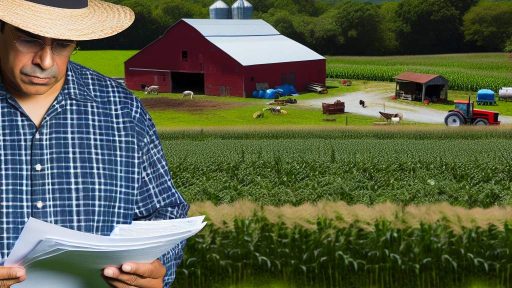Introduction to Agricultural Conservation Programs
Agricultural conservation programs play a crucial role in promoting sustainable farming practices.
These programs support farmers in implementing methods that protect the environment.
They aim to enhance soil health, improve water quality, and conserve biodiversity.
The Importance of Conservation in Agriculture
Conservation practices mitigate the effects of climate change in agriculture.
Farmers adopting these practices can improve resilience against extreme weather events.
This results in more stable crop yields over time.
Types of Agricultural Conservation Programs
Various programs exist to assist farmers with conservation efforts.
- Cost-share programs help cover the expenses of implementing conservation practices.
- Technical assistance offers expertise on best practices for environmental protection.
- Incentives encourage farmers to adopt new technologies that promote sustainability.
Eligibility and Compliance Requirements
Farmers must meet specific criteria to participate in these programs.
Enrollment usually requires compliance with environmental standards.
Additionally, participants must regularly report on their conservation efforts.
Benefits of Participation
Engaging in conservation programs brings multiple advantages for farmers.
They can receive financial support, aiding with operational costs.
Furthermore, improved environmental practices can enhance farm productivity.
Many consumers also prefer products from environmentally responsible farms.
Challenges in Implementation
Implementing conservation practices can be demanding for farmers.
Transform Your Agribusiness
Unlock your farm's potential with expert advice tailored to your needs. Get actionable steps that drive real results.
Get StartedCost limitations often hinder the adoption of necessary technologies.
Moreover, navigating regulations can prove complex and time-consuming.
Overview of Compliance Requirements
Importance of Compliance
Compliance ensures that agricultural conservation programs meet legal and environmental standards.
It protects natural resources and promotes sustainable farming practices.
Farmers benefit from financial assistance while adhering to compliance regulations.
Key Regulations
Several major regulations govern agricultural conservation programs.
The Clean Water Act plays a vital role in protecting water quality.
This act regulates discharges into U.S. waters and sets water quality standards.
Additionally, the Endangered Species Act protects threatened and endangered species.
Compliance with this act often requires habitat preservation measures.
Federal Agencies Involved
Various federal agencies oversee compliance requirements in agricultural programs.
The United States Department of Agriculture (USDA) is a key player.
It implements policies that enhance conservation efforts on farms.
The Natural Resources Conservation Service (NRCS) specifically advises farmers on best practices.
Funding and Grants
Financial incentives are crucial for encouraging compliance among farmers.
Programs like the Environmental Quality Incentives Program (EQIP) offer support.
Farmers can receive cost-sharing assistance for implementing conservation practices.
Monitoring and Reporting
Regular monitoring is essential to ensure compliance with conservation standards.
Farmers must submit reports detailing their conservation practices.
This reporting often includes data on pollution reduction and soil health improvements.
Consequences of Non-Compliance
Failing to comply with regulations can lead to significant penalties.
Farmers may face financial repercussions, including loss of funding.
Furthermore, non-compliance can damage a farm’s reputation and marketability.
Key Legislation Impacting Agricultural Conservation
Introduction to Agricultural Conservation Legislation
Agricultural conservation legislation plays a vital role in sustainable farming.
Showcase Your Farming Business
Publish your professional farming services profile on our blog for a one-time fee of $200 and reach a dedicated audience of farmers and agribusiness owners.
Publish Your ProfileIt governs practices that protect the environment while supporting farming communities.
Understanding these laws is essential for compliance and effective land management.
Federal Legislation Overview
Several federal laws significantly impact agricultural conservation efforts.
The Farm Bill is one of the most influential pieces of legislation.
This comprehensive act includes provisions for conservation programs.
It establishes funding for initiatives that support soil health and water quality.
Conservation Programs in the Farm Bill
The Farm Bill includes various conservation programs.
- The Environmental Quality Incentives Program (EQIP) offers financial assistance for implementing conservation practices.
- The Conservation Reserve Program (CRP) incentivizes landowners to convert highly erodible land to native vegetation.
- The Agricultural Conservation Easement Program (ACEP) protects agricultural land from development.
State Legislation and Local Programs
State laws also influence agricultural conservation practices.
Each state can tailor its programs to address local environmental concerns.
Many states coordinate with federal initiatives to enhance their effectiveness.
Local requirements often focus on specific challenges, such as water management and soil preservation.
Examples of State-Level Programs
States like California have introduced innovative conservation initiatives.
- The California Healthy Soils Program promotes practices that improve soil health.
- The Colorado Water Conservation Board focuses on managing interstate water resources.
- New York’s Agricultural Environmental Management program encourages sustainable farming practices.
International Agreements and Their Impact
International agreements also affect conservation practices in agriculture.
Trade agreements can include environmental standards relevant to agricultural practices.
For instance, the North American Free Trade Agreement (NAFTA) has provisions addressing ecological concerns.
These agreements encourage member countries to adopt sustainable practices.
Global Conservation Efforts
Sustainable agriculture is critical on a global scale.
International organizations advocate for conservation measures worldwide.
- The Food and Agriculture Organization (FAO) promotes sustainable agricultural practices globally.
- The United Nations’ Sustainable Development Goals emphasize responsible food production.
- Many countries collaborate on initiatives to reduce deforestation and soil degradation.
You Might Also Like: Benefits of Farm-To-Table Policies: Enhancing Sustainability in Farming
Eligibility Criteria for Conservation Programs
Overview of Conservation Programs
Conservation programs provide funding and support for sustainable agricultural practices.
These programs aim to enhance environmental quality and promote resource conservation.
Farmers and landowners can participate in various conservation initiatives.
General Eligibility Requirements
To qualify for conservation programs, applicants must meet specific criteria.
Eligible participants are usually farmers, ranchers, and landowners.
Applicants often need to own or control the land they wish to enroll.
Additionally, they must comply with applicable federal and state laws.
Specific Program Criteria
Each conservation program may have distinct eligibility criteria.
For instance, the Environmental Quality Incentives Program focuses on promoting various practices.
Conversely, the Conservation Reserve Program aims to restore environmentally sensitive land.
Therefore, applicants should understand the specific requirements for each program.
Income Restrictions
Some conservation programs impose income restrictions on applicants.
These limitations ensure assistance goes to those most in need.
For example, programs may prioritize small and moderate-sized farms.
Site-Specific Requirements
Programs may also mandate site-specific criteria for eligibility.
Land must meet conservation standards related to erosion and water quality.
Additionally, specific practices may be required to maintain funding eligibility.
Previous Participation Considerations
Prior participation in federal programs can affect eligibility.
Some initiatives may not allow individuals who have recently participated in similar programs.
Ultimately, applicants should verify their previous engagement with federal conservation initiatives.
Documentation and Application Process
This process involves submitting a formal application to the relevant agency.
Showcase Your Farming Business
Publish your professional farming services profile on our blog for a one-time fee of $200 and reach a dedicated audience of farmers and agribusiness owners.
Publish Your ProfileApplicants usually need to provide detailed information about their operation.
Supporting documentation may include land ownership deeds and income statements.
Review and Approval Process
Once submitted, applications undergo a thorough review process.
Agencies assess applications based on defined eligibility criteria.
Successful applicants receive notification and guidance on program participation.
Discover More: Steps to Apply for Agricultural Insurance Coverage
Common Compliance Violations and Consequences
Overview of Compliance Issues
Compliance with agricultural conservation programs is crucial for sustainable practices.
Many farmers face challenges in adhering to regulations.
Understanding common violations helps mitigate risks.
Frequent Compliance Violations
One common violation is the failure to implement soil conservation measures.
Neglecting to maintain cover crops can also lead to non-compliance.
Inadequate record-keeping practices jeopardize compliance status.
Improper application of fertilizers and pesticides is another serious issue.
Impacts of Violations
The consequences of non-compliance can be significant.
Farmers may face financial penalties and reduced eligibility for funding.
Additionally, persistent violations can result in program disqualification.
Long-term harm to the environment is another serious consequence.
Legal and Financial Repercussions
Legal actions can arise from repeated compliance failures.
Fines for violations can accumulate quickly.
Compromised relationships with regulatory bodies may also occur.
Strategies for Ensuring Compliance
Proactive measures are essential to prevent compliance issues.
Regular training sessions can educate staff on best practices.
Moreover, farmers should stay updated with changing regulations.
Establishing internal audits helps identify potential violations early.
Delve into the Subject: Water Conservation Strategies In Agricultural Policies
Documentation and Recordkeeping Requirements
Importance of Accurate Documentation
Accurate documentation is vital for agricultural conservation programs.
It helps demonstrate compliance with regulatory standards.
Moreover, it supports transparency within the farming community.
Types of Required Documentation
Farmers must maintain several types of documentation.
These include land management plans and conservation practices records.
Additionally, they should keep financial records related to conservation efforts.
Retention Periods for Records
Farmers should retain these records for a specified period.
Typically, records should be kept for at least three years.
However, some documents may require longer retention periods.
Format and Accessibility
Documentation can be maintained in digital or paper formats.
Farmers must ensure that records are easily accessible.
This accessibility aids inspections and audits efficiently.
Training and Awareness
Training is essential for proper recordkeeping practices.
Farmers should seek information sessions on documentation requirements.
Awareness of these practices enhances compliance significantly.
Showcase Your Farming Business
Publish your professional farming services profile on our blog for a one-time fee of $200 and reach a dedicated audience of farmers and agribusiness owners.
Publish Your ProfileDiscover More: Top Renewable Energy Tax Credits Available to Farmers

Monitoring and Reporting Procedures for Farmers
Importance of Compliance
Compliance ensures that conservation programs achieve their goals.
Farmers must adhere to established guidelines.
This process enhances environmental sustainability.
Setting Up Monitoring Systems
Farmers should establish a monitoring system tailored to their specific operations.
This system must track environmental impacts accurately.
It should include regular checks and assessments.
Moreover, the system must be easy to use and maintain.
Utilizing Technology
Technology can greatly enhance monitoring capabilities.
Farmers may use software solutions to gather data efficiently.
Drones and sensors also provide valuable information.
As a result, these tools improve data accuracy.
Documentation Practices
Proper documentation is crucial for compliance reporting.
Farmers should maintain detailed records of their activities.
These records help demonstrate adherence to conservation practices.
Furthermore, regular updates support ongoing evaluation.
Reporting Requirements
Farmers need to submit periodic reports to relevant authorities.
Reports often include data on practices and outcomes.
Timeliness is essential for maintaining compliance.
Farmers should verify submission dates to avoid penalties.
Data Accuracy and Integrity
Accurate data strengthens the credibility of reports.
Farmers should double-check information before submission.
This practice reduces the risk of errors.
Additionally, data integrity fosters trust with regulatory bodies.
Responding to Feedback
Feedback from authorities can provide important insights.
Farmers must be open to making adjustments based on this feedback.
This responsiveness demonstrates commitment to conservation goals.
Ultimately, adapting practices helps improve program success.
Continuous Improvement
Farmers should seek ways to improve their compliance processes.
Regular training can enhance understanding of requirements.
Networking with peers allows for sharing best practices.
Moreover, staying informed about new regulations is essential.
Best Practices for Maintaining Compliance
Understanding Compliance Requirements
Compliance requirements for agricultural conservation programs can be complex.
Farmers and landowners must stay informed about the latest regulations.
Learning the specifics of each program is essential for successful participation.
Regular Training and Education
Continuous education helps keep stakeholders updated on compliance standards.
Participating in workshops and seminars enhances knowledge and skills.
Additionally, engaging with agricultural extension services provides valuable insights.
Documentation and Record Keeping
Meticulous documentation is crucial for demonstrating compliance.
Farmers should maintain detailed records of their conservation practices.
Showcase Your Farming Business
Publish your professional farming services profile on our blog for a one-time fee of $200 and reach a dedicated audience of farmers and agribusiness owners.
Publish Your ProfileThis includes financial records, activity logs, and photographs of practices.
Regular audits of records can help identify gaps and areas for improvement.
Engagement with Local Agencies
Building relationships with local conservation agencies fosters support.
These agencies often provide resources and guidance on compliance requirements.
Regular communication with them keeps farmers informed about any changes to regulations.
Adoption of Technology
Utilizing technology can streamline compliance efforts significantly.
Management software can help track practices and deadlines.
Furthermore, GPS and mapping tools enhance land management strategies.
Utilizing Peer Support Networks
Joining local farming groups fosters collaboration and exchange of information.
These networks can share best practices and experiences on compliance strategies.
Furthermore, they can provide encouragement and accountability among members.
Regularly Reviewing and Updating Practices
Regular reviews of compliance practices ensure they remain effective.
Adjusting strategies in response to new regulations is essential for compliance.
Various resources are available to assist with updates in practices.
Future Trends in Compliance for Conservation Programs
Emerging Technologies in Compliance Monitoring
Innovative technologies are changing compliance monitoring in agriculture.
Farmers increasingly use drones to assess land and crop conditions.
These aerial systems provide real-time data for better decision-making.
Moreover, satellite imaging supports large-scale compliance assessments.
This technology enhances transparency and accountability in agricultural practices.
Integration of Data Analytics
Data analytics plays a crucial role in compliance efficiency.
Farmers utilize data to track and report their conservation practices.
Advanced analytics helps in predicting compliance risks early.
Consequently, proactive adjustments can be made to avoid violations.
Policy Changes and Adaptation
Regulatory frameworks are evolving alongside environmental concerns.
New policies aim for stricter enforcement of conservation standards.
Farmers must adapt their operations to align with these updates.
Additionally, guidelines are becoming more comprehensive and detailed.
Increased Collaboration with Stakeholders
Collaboration among stakeholders is gaining importance.
Farmers, regulators, and environmental groups are working together.
This cooperation fosters shared responsibility for conservation outcomes.
Furthermore, partnerships enhance the exchange of best practices.
Emphasis on Education and Training
Education is vital for ensuring compliance with conservation programs.
Training programs provide farmers with necessary skills and knowledge.
Understanding compliance requirements leads to more effective practices.
As a result, educated farmers increase their chances of success.
Additional Resources
Conservation Compliance and U.S. Farm Policy
Laws and Regulations that Apply to Your Agricultural Operation by …




